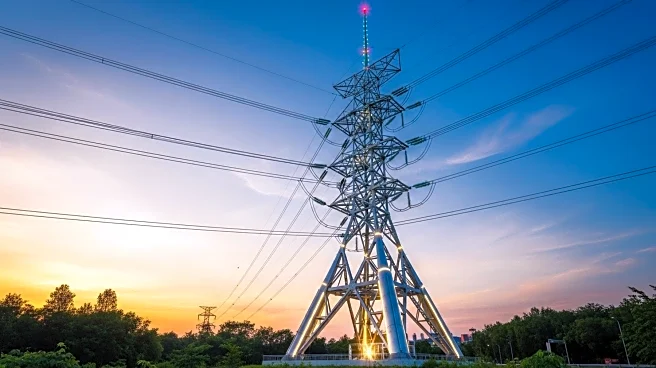What's Happening?
Virginia is taking significant steps to modernize its power grid by embracing advanced transmission technologies. The General Assembly, with the support of Governor Glenn Youngkin, has passed legislation aimed at deploying advanced conductors to maximize power delivery from existing lines. Starting in 2026, the State Corporation Commission will be required to consider these technologies when planning to increase power supply on the grid. This initiative is part of a broader effort to address the growing electricity demand driven by data centers and manufacturing, ensuring a stable and efficient power supply. Advanced conductors, known as high-performance conductors (HPCs), can double electricity transmission capacity, reduce power loss by up to 30%, and improve grid efficiency. This move is expected to reduce disruptions for communities and shorten wait times for businesses connecting to the grid.
Why It's Important?
The adoption of advanced transmission technologies in Virginia is crucial for maintaining energy affordability and supporting economic growth. As the demand for electricity increases, particularly from data centers and manufacturing, efficient power delivery becomes essential. By implementing HPCs, Virginia aims to reduce consumer power bills and enhance grid reliability. This initiative aligns with the state's goal to lead in the digital economy and artificial intelligence sectors. The deployment of HPCs is anticipated to save American consumers billions in energy costs, with major companies like Google investing in these technologies to drive savings. The legislation represents a proactive approach to modernizing the power infrastructure, ensuring Virginia remains competitive in the global market.
What's Next?
The next steps involve the State Corporation Commission ensuring the successful implementation of the legislation by requiring utilities to adopt innovative power line technologies. This will involve transitioning from traditional reinvestment strategies to embracing HPCs for new transmission projects. The focus will be on demonstrating the cost savings and efficiency improvements offered by these advanced conductors. As the PJM Interconnection finalizes its long-term transmission plans, Virginia's regulators will play a key role in driving the adoption of HPCs, reducing grid pressure, and supporting the state's economic growth.
Beyond the Headlines
The shift towards advanced transmission technologies in Virginia highlights broader implications for energy policy and infrastructure development. The use of HPCs not only addresses immediate power delivery challenges but also sets a foundation for future energy solutions. This transition reflects a growing recognition of the need for sustainable and efficient energy systems to support technological advancements and economic expansion. The focus on innovation in power infrastructure may influence other states to adopt similar strategies, contributing to a nationwide effort to modernize the energy grid.









